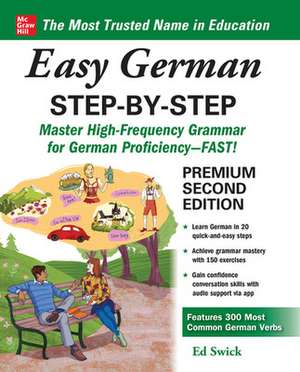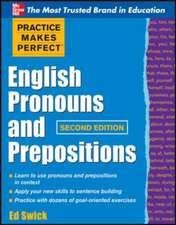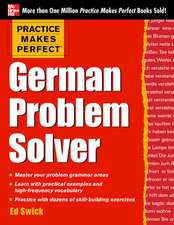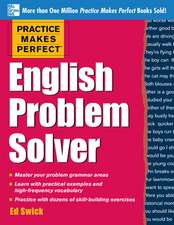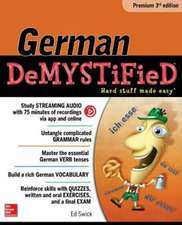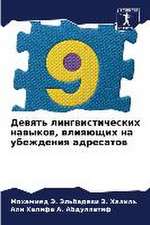Easy German Step-by-Step, Second Edition
Autor Ed Swicken Limba Engleză Paperback – 30 sep 2019
Get the skills you need to begin communicating in German quickly and easily!
Communicating in a new language can be intimidating. This accessible guide will give you the tools and confidence to understand and converse in German with confidence. Based on the idea that the quickest route to learning a language is through a solid foundation in the basics, Easy German Step-by-Step presents a successful building block approach to mastering German, with important concepts linked together by clear explanations, appropriate exercises, and helpful answers.
The first steps introduce you to the everyday expressions of the language, allowing you to communicate in a variety of everyday situations almost immediately. Gradually, a series of interconnected steps takes you from simple to more challenging concepts at your own pace. After working through these exercises, you'll have a better grasp of the language and the skills to handle German with confidence. New for this second edition, the McGraw-Hill Language Lab app streams accompanying audio recordings to help you improve your German pronunciation and fluency.
Easy German Step-by-Step, Second Edition features:
• Easy-to-grasp descriptions of essential rules and concepts
• Key verbs and hundreds of key terms introduced on the basis of frequency
• Numerous exercises that give you valuable practice
• Audio recordings of exercise answers throughout the book, streamed via the McGraw-Hill Language Lab app (web and mobile)
Preț: 86.25 lei
Nou
Puncte Express: 129
Preț estimativ în valută:
16.50€ • 17.28$ • 13.66£
16.50€ • 17.28$ • 13.66£
Carte disponibilă
Livrare economică 15-29 martie
Livrare express 04-08 martie pentru 35.19 lei
Preluare comenzi: 021 569.72.76
Specificații
ISBN-13: 9781260455168
ISBN-10: 1260455165
Pagini: 224
Dimensiuni: 253 x 246 x 17 mm
Greutate: 0.61 kg
Ediția:2
Editura: McGraw Hill Education
Colecția McGraw-Hill
Locul publicării:United States
ISBN-10: 1260455165
Pagini: 224
Dimensiuni: 253 x 246 x 17 mm
Greutate: 0.61 kg
Ediția:2
Editura: McGraw Hill Education
Colecția McGraw-Hill
Locul publicării:United States
Cuprins
Cover
Title Page
Copyright Page
Dedication
Contents
Preface
1 Pronunciation and Cognates
The Alphabet
Step 1: Consonants
Step 2: Vowels
Letter Combinations
Consonants
Vowels
Step 3: Cognates
2 Gender and heißen
German Gender
Step 1: Masculine
Step 2: Feminine
Step 3: Neuter
Heißen
3 Nominative Pronouns, der-Words, and the Verb sein
German Personal Pronouns
Step 1: Third Person Pronouns and Gender
Step 2: Der-Words
The Verb sein
4 Ein-Words, haben, and the Present Tense
Ein-Words
Kein
Step 1: Possessive Adjectives
Step 2: The Verb haben
Present Tense
5 Irregular Present Tense and werden
Irregular Present Tense
Step 1: Irregularities Formed with an Umlaut
Step 2: Irregularities Formed with a Shift from -e- to -i-
Step 3: Irregularities Formed with a Shift from -e- to -ie-
Conjugation of werden
The Impersonal es
6 Accusative Case: Direct Objects and Prepositions
Accusative Case
Step 1: Direct Object Nouns
Step 2: Direct Object Pronouns
Step 3: Prepositions
Masculine Plurals
Mastery Check 1
7 Regular Past Tense and Interrogative Words
The Past Tense
Step 1: The Past Tense Suffix -te
Step 2: Adverbs for the Past Tense
Forming Questions
Step 3: Feminine Plurals
8 Irregular Past Tense and Neuter Plurals
Irregular Past Tense
Step 1: German Irregular Past Tense
Step 2: Numbers, the Year, and Age
Using fragen
Neuter Plurals
9 Dative Case and More Irregular Past Tense
Dative Case
Step 1: Dative Case in German
Haben, sein, werden in the Past Tense
Step 2: Wissen and kennen
10 Dative Expressions and Conjunctions aber, oder, und, and sondern
The Dative Case
Step 1: More Dative Verbs and Dative Expressions
Conjunctions
Step 2: Können und müssen
11 Regular Present Perfect Tense
The Present Perfect Tense
Step 1: Haben and Regular Past Participles
Step 2: Sein and the Present Perfect Tense
Ordinal Numbers and Prefixes
Step 3: Ordinal Numbers
Step 4: Inseparable Prefixes
12 Adjective Endings and Separable Prefixes
Adjectives
Step 1: Adjective Endings
Nominative Case Adjectives
Accusative Case Adjectives
Step 2: Separable Prefixes
13 Irregular Present Perfect Tense and Prefixes
The Irregular Present Perfect Tense
Step 1: German Irregular Past Participles
Step 2: Haben, sein, werden, sterben
Step 3: Prefixes
Mastery Check 2
14 Genitive Case and Antonyms
Genitive Case
Step 1: German Possessives
Step 2: Containers
Step 3: Genitive Prepositions
Antonyms
Step 4: Opposites in German
Gehen
Step 5: Gehen and Infinitives
15 Future Tense and Modal Auxiliaries
The Future Tense
Step 1: German Future Tense
Modal Auxiliaries
Step 2: German Modal Auxiliaries
16 Dependent Clauses and Conjunctions
Dependent Clauses
Step 1: German Clauses
Subordinating Conjunctions
Step 2: Dass and ob
17 Dative-Accusative Prepositions
Prepositions with More Than One Function
Step 1: Dative Case
Step 2: Inanimate Pronouns
Step 3: Accusative Case
Geography
Step 4: Die Welt (The World)
18 Comparative and Superlative
Comparative
Step 1: German Comparative Adverbs and Adjectives
Step 2: Irregular Comparatives
Superlative
Step 3: German Superlative Adverbs and Adjectives
Step 4: Irregular Superlatives
19 Imperatives and Double Infinitives
Commands
Step 1: The German Imperative
Double Infinitives
Step 2: Present Perfect and Future Tenses
Step 3: Helfen, hören, lassen, and sehen
20 Using All the Cases and All the Tenses
Cases and Declensions
Step 1: German Declensions of Nouns and Pronouns
Tenses
Step 2: Varieties in the German Tenses
Mastery Check 3
Appendix A: Fraktur Alphabet (1600–1940)
Appendix B: The Principal Parts of Irregular Verbs
Answer Key
Title Page
Copyright Page
Dedication
Contents
Preface
1 Pronunciation and Cognates
The Alphabet
Step 1: Consonants
Step 2: Vowels
Letter Combinations
Consonants
Vowels
Step 3: Cognates
2 Gender and heißen
German Gender
Step 1: Masculine
Step 2: Feminine
Step 3: Neuter
Heißen
3 Nominative Pronouns, der-Words, and the Verb sein
German Personal Pronouns
Step 1: Third Person Pronouns and Gender
Step 2: Der-Words
The Verb sein
4 Ein-Words, haben, and the Present Tense
Ein-Words
Kein
Step 1: Possessive Adjectives
Step 2: The Verb haben
Present Tense
5 Irregular Present Tense and werden
Irregular Present Tense
Step 1: Irregularities Formed with an Umlaut
Step 2: Irregularities Formed with a Shift from -e- to -i-
Step 3: Irregularities Formed with a Shift from -e- to -ie-
Conjugation of werden
The Impersonal es
6 Accusative Case: Direct Objects and Prepositions
Accusative Case
Step 1: Direct Object Nouns
Step 2: Direct Object Pronouns
Step 3: Prepositions
Masculine Plurals
Mastery Check 1
7 Regular Past Tense and Interrogative Words
The Past Tense
Step 1: The Past Tense Suffix -te
Step 2: Adverbs for the Past Tense
Forming Questions
Step 3: Feminine Plurals
8 Irregular Past Tense and Neuter Plurals
Irregular Past Tense
Step 1: German Irregular Past Tense
Step 2: Numbers, the Year, and Age
Using fragen
Neuter Plurals
9 Dative Case and More Irregular Past Tense
Dative Case
Step 1: Dative Case in German
Haben, sein, werden in the Past Tense
Step 2: Wissen and kennen
10 Dative Expressions and Conjunctions aber, oder, und, and sondern
The Dative Case
Step 1: More Dative Verbs and Dative Expressions
Conjunctions
Step 2: Können und müssen
11 Regular Present Perfect Tense
The Present Perfect Tense
Step 1: Haben and Regular Past Participles
Step 2: Sein and the Present Perfect Tense
Ordinal Numbers and Prefixes
Step 3: Ordinal Numbers
Step 4: Inseparable Prefixes
12 Adjective Endings and Separable Prefixes
Adjectives
Step 1: Adjective Endings
Nominative Case Adjectives
Accusative Case Adjectives
Step 2: Separable Prefixes
13 Irregular Present Perfect Tense and Prefixes
The Irregular Present Perfect Tense
Step 1: German Irregular Past Participles
Step 2: Haben, sein, werden, sterben
Step 3: Prefixes
Mastery Check 2
14 Genitive Case and Antonyms
Genitive Case
Step 1: German Possessives
Step 2: Containers
Step 3: Genitive Prepositions
Antonyms
Step 4: Opposites in German
Gehen
Step 5: Gehen and Infinitives
15 Future Tense and Modal Auxiliaries
The Future Tense
Step 1: German Future Tense
Modal Auxiliaries
Step 2: German Modal Auxiliaries
16 Dependent Clauses and Conjunctions
Dependent Clauses
Step 1: German Clauses
Subordinating Conjunctions
Step 2: Dass and ob
17 Dative-Accusative Prepositions
Prepositions with More Than One Function
Step 1: Dative Case
Step 2: Inanimate Pronouns
Step 3: Accusative Case
Geography
Step 4: Die Welt (The World)
18 Comparative and Superlative
Comparative
Step 1: German Comparative Adverbs and Adjectives
Step 2: Irregular Comparatives
Superlative
Step 3: German Superlative Adverbs and Adjectives
Step 4: Irregular Superlatives
19 Imperatives and Double Infinitives
Commands
Step 1: The German Imperative
Double Infinitives
Step 2: Present Perfect and Future Tenses
Step 3: Helfen, hören, lassen, and sehen
20 Using All the Cases and All the Tenses
Cases and Declensions
Step 1: German Declensions of Nouns and Pronouns
Tenses
Step 2: Varieties in the German Tenses
Mastery Check 3
Appendix A: Fraktur Alphabet (1600–1940)
Appendix B: The Principal Parts of Irregular Verbs
Answer Key
